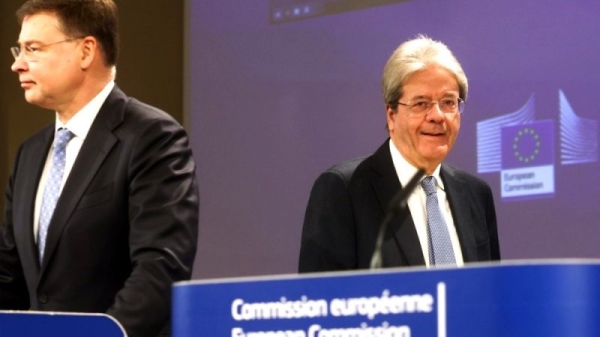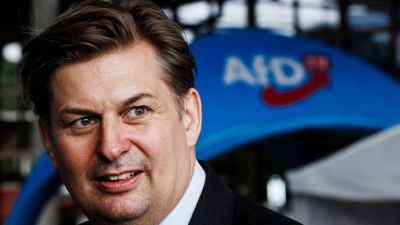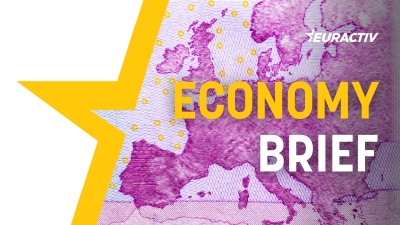Commission to simplify RRF audits despite recent fraud scandals

The European Commission will push ahead with plans to simplify member states’ auditing and control procedures for the Recovery and Resilience Facility (RRF) payments despite recent allegations of fraud, top Commission officials told EU lawmakers on Monday (22 April).
Speaking in Strasbourg at the European Parliament’s last plenary before the June elections, Economy Commissioner Paolo Gentiloni and Trade Commissioner Valdis Dombrovskis stressed that alleviating member states’ “administrative burden” need not weaken the billion RRF’s “robust” anti-graft protections.
“States are required to collect a host of additional data for audit and control purposes carried out by different authorities” such as national auditing bodies, the European Court of Auditors (ECA) and the Commission itself, Gentiloni said.
“Some member states perceive these as sometimes overlapping,” he said.
However, “the Commission remains open to exploring potential areas of simplification,” he said, adding that the EU executive will stick with “its long-standing commitment to ensure high levels of scrutiny of their efforts”.
“Simplification doesn’t mean [losing] this scrutiny capacity,” he added.
Dombrovskis, who is also one of the Commission’s three executive vice presidents, emphasised that the European Public Prosecutor’s Office’s (EPPO) ongoing investigations into hundreds of suspected cases of RRF-related embezzlement might not necessarily yield any convictions.
“We need to recall the distinction between a case or investigation and demonstrated irregularity, because [the] investigation might also conclude that there was no actual illegality.”
The Commissioners largely reiterated the EU executive’s mid-term evaluation of the facility in February this year, which stated that “identifying potential areas of simplification” of the RRF’s “complex audit and control framework… remains a priority”.
Greek and Italian reported fraud compound RRF oversight warnings
Two suspected cases of embezzlement linked to RRF money have recently been reported from Greece and Italy.
In late March, authorities in Greece raided the offices of ten tech companies, including the country’s three telecommunications providers, for suspected misappropriation of €2.5 billion in RRF funds.
Earlier this month, 22 individuals were arrested across Italy, Austria, Romania, and Slovakia after an investigation by EPPO’s Venice office uncovered an alleged case of RRF-related fraud totalling €600 million.
Such scandals also come amid growing concern about the RRF’s lack of centralised oversight.
One week before the scandal in Greece broke, ECA president Tony Murphy cautioned that the Commission’s policy of relying on member states to ensure the funds are properly spent is increasing “the risk of irregularity or even corruption”.
In a subsequent interview with Euractiv, conducted just days after the scandal in Italy was reported, Murphy warned that there was a high risk that similar cases could be repeated due to the “limited control” exercised over the funds by Brussels.
The facility’s scheduled expiry by the end of 2026, Murphy said, would be “contributing to the risk” of the funds’ misappropriation by amplifying “pressure on member states to spend this money quickly”.
Other EU institutions have also warned about the dangers of RRF funds being misused in recent years, including the European Parliament’s Budgetary Control Committee and the European Anti-Fraud Office (OLAF).
However, at a press conference following a meeting of EU finance ministers in Luxembourg earlier this month, Belgian Finance Minister Vincent Van Peteghem told reporters there had been “no discussion” about the recent scandals involving RRF financing.
‘Our Hamiltonian moment cannot finish in an archive’
Agreed at the height of the COVID-19 pandemic in 2020 with the aim of boosting member states’ post-pandemic recoveries, the €723bn RRF comprises €338 billion in grants and €385.8 billion worth of loans, financed through debt jointly underwritten by member states.
A total of €231.89 billion — or less than a third of the total facility — has thus far been disbursed – with Italy, the bloc’s third biggest economy and the first hit by the pandemic, receiving 44% of that sum: €147.74 billion in grants and €84.15 billion in loans.
During Tuesday’s hearing, however, Gentiloni reiterated his hope that the RRF will become a “blueprint” for future EU spending programmes.
“I think this issue of common financing will be very important, maybe in the discussion in the electoral campaign, but especially for the new political cycle,” Gentiloni said, emphasising the need for a permanent public funding strategy.
“Our Hamiltonian moment cannot, in my view, finish in an archive,” he said, in reference to the first US Treasury secretary, who fostered the creation of an economic and fiscal union.
Read more with Euractiv




